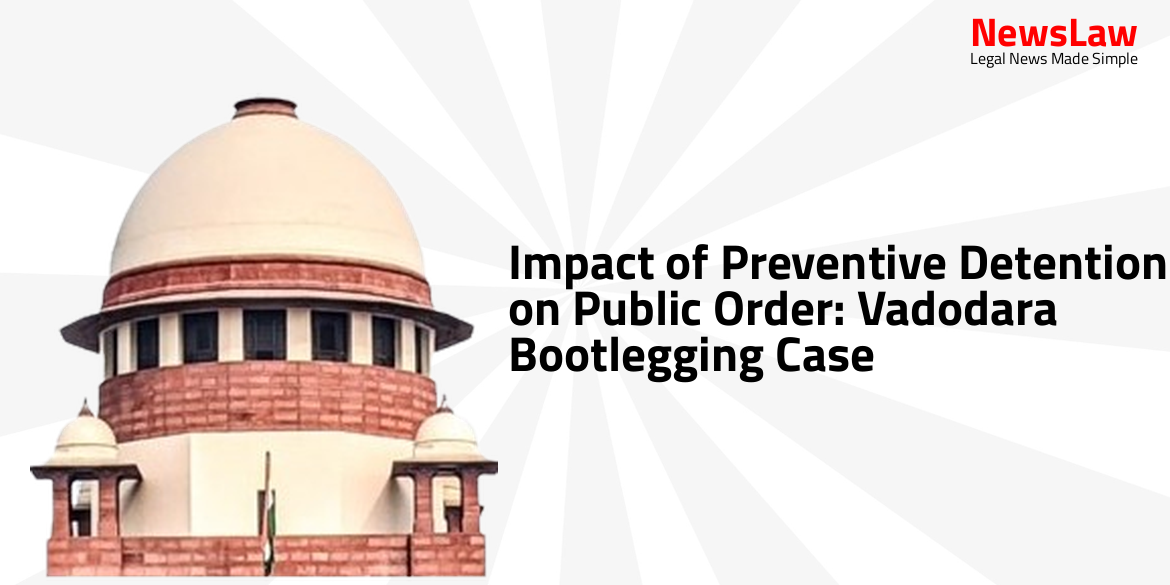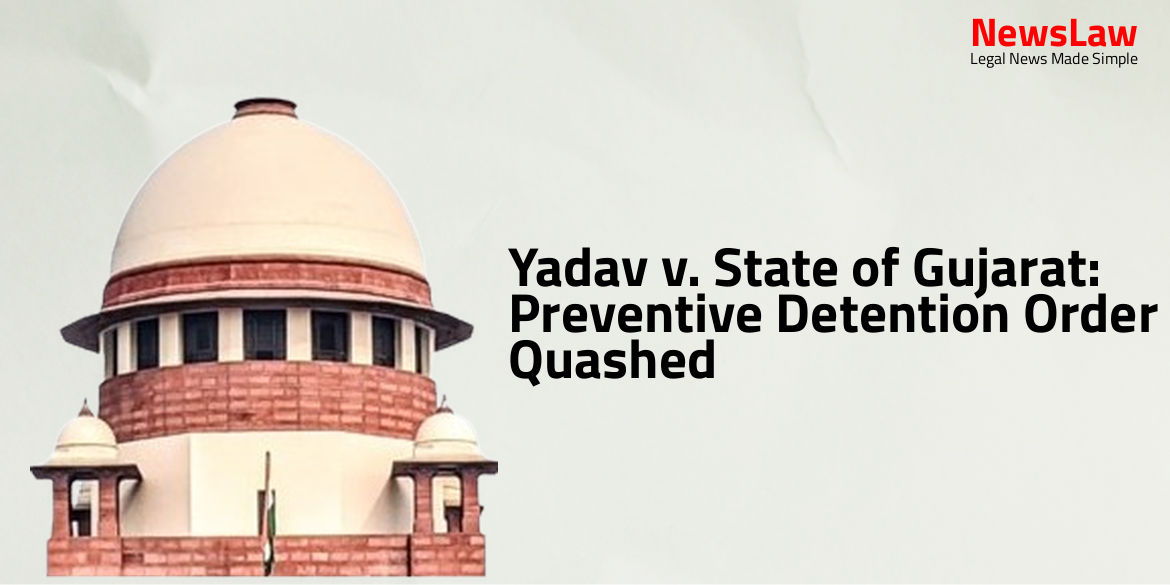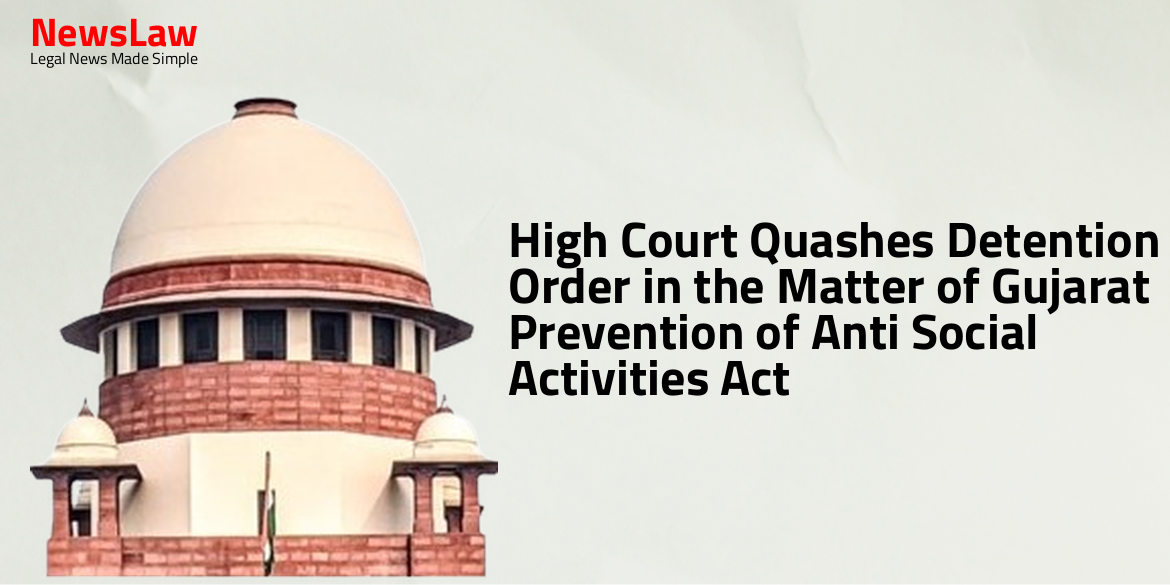Exploring the impact of preventive detention on public order, the Gujarat High Court recently delivered a crucial judgment in the Vadodara bootlegging case. The court examined the detaining authority’s hasty decision and lack of concrete evidence to support the detention order. Focus was placed on the necessity of proving a direct link between the petitioner’s activities and potential threats to public order. Stay tuned to delve into the legal intricacies of this significant case.
Facts
- The challenge is to the detention order dated 09.11.2023 passed by the Police Commissioner, Vadodara.
- The petitioner has been detained as a ‘bootlegger’ based on a solitary offence registered against him.
Arguments
- Learned Advocate for the detenue argues that the alleged illegal activity is not related to the maintenance of public order.
- There is no nexus between the alleged activity and public order as claimed by the authorities.
- The advocate states that the alleged illegal activity does not pose a threat to public order.
- Learned AGP supported the detention order passed by the authority, stating sufficient material and evidence were found during investigation.
- The detention order was passed on 09.11.2023, based on the grounds indicating registration of a solitary FIR.
- The State could have filed a cancellation of bail application through due process of law to prevent further offenses by the petitioner.
- The fact that the petitioner was granted regular bail by a competent court wasn’t considered in the detention order, which did not reflect an application of mind.
- The Detaining Authority did not consider the option of canceling bail to curb the petitioner’s activities.
- Besides witness statements, FIR registration, and Panchnama, no other relevant material connected the detenue’s alleged anti-social activity to a breach of public order.
- The petitioner’s activity in the solitary criminal case did not have a significant impact on society’s normal and routine life, posing no threat to public order.
Analysis
- Petition filed under Article 226 of the Constitution of India
- Relief sought is to quash and set aside the actions of the respondent authorities
- No appearance by DS for the Respondents
- Appearance by Ms. Hasmeet B Gill for the Petitioner
- Appearance by Mr. Yuvraj Brahmbhatt, AGP for the Respondents
- Hon’ble Mr. Justice A.Y. Kogje and Hon’ble Mr. Justice Samir J. Dave presiding over the case
- Date of the oral judgment is 08/05/2024
- The detaining authority passed the order of detention hastily and mechanically after the petitioner was released on bail.
- There is no concrete evidence to support the conclusion that the petitioner’s sale of liquor has led to disturbance in society or damage to public health.
- The detaining authority did not arrive at subjective satisfaction through proper application of mind.
- Registration of a solitary offence under the Prohibition Act does not automatically warrant preventive detention under the PASA Act.
- The petitioner may be a ‘bootlegger’ but this alone is not sufficient grounds for preventive detention unless his activities adversely affect public order.
- The alleged offences committed by the petitioner do not significantly impact public health or the community.
- Failure of the detaining authority to substantiate how the petitioner’s activities are likely to affect adversely the maintenance of public order.
- Absence of a Forensic Science Laboratory (FSL) report in the case record.
- In a previous case of Darpan Kumar Sharma vs. State of Tamil Nadu, the Hon’ble Supreme Court reinforced the view taken by this Court.
- In the case of Raju Manubhai Lalu vs. State of Gujarat, it was observed that merely possessing or selling Indian made foreign liquor does not pose a threat to public order.
- The coordinate Bench in the case of Vasava Umeshbhai Laxmanbhai vs. State of Gujarat emphasized that the detaining authority must have justifiable subjective satisfaction based on objective material to detain a person preventively.
- The Court referred to a reported judgment in Sohanlal Surjaram Visnoi, where it was noted that preventive detention can be based on a solitary incident if it is likely to impact public order adversely.
- The subjective satisfaction of the detaining authority would be considered invalid if the alleged activity does not affect public order as required by the law, as seen in the case of Shaik Nazeen vs. State of Telangana.
- Absence of material on record invalidates subjective satisfaction of detaining authority
- Detaining authority cannot make conclusions without supporting evidence
- Subjective satisfaction of detaining authority is deemed vitiated due to lack of basis
Decision
- Direct service is permitted in this case.
- The detenue will be set at liberty immediately if not needed in any other case.
- Registration of FIRs alone does not relate to the breach of public order.
- The authority cannot use the Act without relevant material.
- The petition is allowed, and the detention order is quashed and set aside.
Case Title: KALU @ KALU TOPI SUNDARDAS TELWANI THROUGH DHIRAJ LILARAM TELWANI Vs. STATE OF GUJARAT
Case Number: R/SCA/20210/2023



